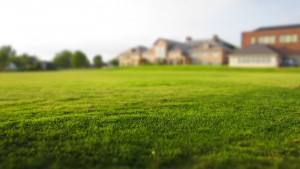Mulch for Your Lawn: Organic vs. Inorganic
 Common organic mulch includes shredded bark, bark chips, wood chips, pine needles, hay, leaves, compost and grass clippings. Common inorganic mulch includes stones or gravel, black plastic which are typically used in vegetable gardens and rubber chips which are better used as a safety surface in playgrounds than plants or in the landscape.
Common organic mulch includes shredded bark, bark chips, wood chips, pine needles, hay, leaves, compost and grass clippings. Common inorganic mulch includes stones or gravel, black plastic which are typically used in vegetable gardens and rubber chips which are better used as a safety surface in playgrounds than plants or in the landscape.
The Pros And Cons Of Inorganic Mulch
PROS: Inorganic mulch, like stone, doesn’t break down and therefore doesn’t require regular replacement. This can save you time and money.
CONS: Stone retains the sun’s heat and creates a warmer and drier soil environment, which could be detrimental to plants that do not thrive in this type of situation. However, some plants do thrive in a warmer environment so it’s best to understand the environmental needs of your plants before deciding on the type of mulch you’re going to use. The use of some gravel, like marble chips, will alter the soil’s pH level toward the basic range. This is a problem because most plants like acidic or neutral conditions. Also, inorganic mulch does not improve soil structure or add organic matter.
The Pros And Cons Of Organic Mulch
PROS: Any organic mulch is better for plants than inorganic mulch. Over time, organic mulches will slowly decompose and release nutrients into the soil and improve its structure. Organic mulches also keep the soil cooler and retain moisture levels more than than inorganic mulches.
CONS: Because organic mulch decomposes, it must be replenished on a regular basis.
Mulching Your Vegetable Garden
Your mulch choice will vary depending on the type of crop that you plant. Some vegetables do best in very hot conditions; for these, using black plastic covered by a type of organic mulch chosen for its aesthetics would be appropriate. For vegetables that are better off in cooler conditions, one of the organic mulches alone is an appropriate choice.
Mulching Your Flower Garden
The use of any of the organic mulches is best for flower gardens. Again, if the plants in question are drought- and heat-tolerant, then the use of gravel could also work.
